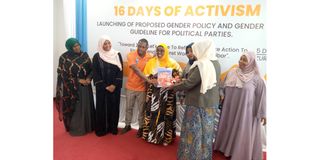Zanzibar unveils groundbreaking gender policy for political parties

The acting director of the Zanzibar Women with Disabilities Association (Juwaza), Sabah Ali Mzee, cutting the ribbon to mark the launch of the proposed gender policy model for political parties in Zanzibar.
Unguja. A groundbreaking gender policy has been introduced for political parties in Zanzibar, aiming to promote gender equality in political systems and democratic processes.
Along with the policy, a proposed gender desk structure has also been launched for political parties on the island.
Key elements of the policy stress the need for each political party to adopt plans that promote women's participation in leadership roles, targeting a 40 percent representation.
Every party is encouraged to ensure gender equality and work toward a 50-50 balance between men and women.
The policy mandates that parties develop clear strategies, plans, and budgets, which should be implemented with capacity-building initiatives to provide equal opportunities for women. The political party registrar is tasked with ensuring the policy’s enforcement.
The policy and gender desk structure were developed by the Zanzibar Association of Women Journalists (Tamwa), the Gender and Environmental Protection Association in Pemba (Pegao), the Zanzibar Female Lawyers Association (Zafela), and the Zanzibar Women with Disabilities Association (Juwauza), with support from the Norwegian Embassy in Tanzania.
At the policy launch on December 6, 2024, during the 16 Days of Activism Against Gender-Based Violence, Tamwa director Dr Mzuri Issa highlighted that the policy is designed to ensure both women and men equally participate in political systems and decision-making processes.
"The goal of this policy is to create a foundation for gender integration in planning, implementation, monitoring, and evaluation of social, economic, cultural, and political processes, fostering gender equality and development in Zanzibar," she explained.
Dr Issa also noted that Tanzania, as a Commonwealth member, has signed several international treaties aimed at achieving gender equality, including the 1945 UN Charter, the 1948 Universal Declaration of Human Rights, and the 1966 International Covenant on Civil and Political Rights.
However, she stressed that the policy’s success relies on the commitment and contributions of political parties and other institutions.
Policy advisor Dr Sikujua Omar, despite acknowledging the lack of data in some areas, pointed out that women are still vastly underrepresented in political decision-making.
"In Zanzibar, women represent just 37 percent of the House of Representatives, and their participation largely depends on special seats," she said.
Dr Sikujua, a lecturer at the University of Zanzibar, further noted that the policy aligns with recent legal reforms that emphasize gender participation, safety, and equal representation in politics.
She referenced the 2024 Elections Act, specifically Section 135, which aims to prevent gender-based violence in political processes and calls on political parties to enforce policies protecting participants from gender-based abuse.
"Women face numerous barriers to meaningful participation in elections, whether as voters, candidates, or election agents. These barriers include cultural norms, exclusion from male-dominated decision-making spaces, lack of financial resources, limited access to information, and widespread discrimination," she explained.
Kjetil Schie, head of mission at the Norwegian Embassy, emphasised the critical importance of women’s leadership in development.
"As Tanzania prepares for next year’s general election, gender equality must be prioritized to ensure young women, in particular, can fully participate in the process."
Schie also noted the ongoing gender imbalance at senior leadership levels, despite the presence of many women with the potential to lead.
"When we empower women, the country benefits from a stronger economy and more stable leadership," he said, citing Norway’s example where 40 percent of public sector leaders are women, and many women also lead in the private sector.
Halima Ibrahim Mohamed of ACT Wazalendo shared that her party has already begun implementing gender policies since its launch in April, with plans to establish a gender desk.
"These ideas were always in our minds, but now we’re putting them into action," she said, encouraging other political parties to follow suit.
Azah Ali Seleman from the Democracy and Development Party said that she is now more motivated to pursue leadership roles, feeling empowered and confident in her abilities.
NCCR Mageuzi Deputy Secretary-General Mgeli Mshindani Ali stressed that empowering women must align with the country's broader development goals, advancing Zanzibar towards becoming a fully developed nation



